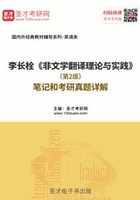
第9章 主动语态、被动语态和强势动词
本章论述主动语态和被动语态的使用情形,指出句子结构的选择与原文没有关系,而是要服从译文需要。
一、使用主动语态的原因
The Elements of Style认为:
主动语态比被动语态更直接、有力。试比较:
I shall always remember my first visit to Boston.
My first visit to Boston will always be remembered by me.
后一句不够直接、有力,也不够简洁。如果省略by me,句子就简洁了一些:My first visit to Boston will always be remembered.但意思就不确定了:是谁来remember呢?作者、作者心里的某个人,还是全世界?
使用主动语态迫使作者指出动作发出者,从而避免意思含糊不清,让读者知道履行义务的人是谁。
The messenger will deliver the material.
二、不仅用主动语态,还要用强势动词
把被动语态变为主动语态,例:
A:The foregoing Fee Table is intended to assist investors in understanding the costs and expenses that a shareholder in the Fund will bear directly or indirectly.
B:This table describes the fees and expenses you may pay in connection with an investment in our fund.
三、被动语态的使用情形
1.信息流动的需要
After the Summit the President was interviewed by a ten-year-old pupil from the European School.
本句用被动把新信息放在句末。
Some astonishing questions about the nature of the universe have been raised by scientists exploring the nature of black holes in space. A black hole is created by the collapse of a dead star into a point perhaps no larger than a marble. So much matter compressed into so little volume changes the fabric of space around it in profoundly puzzling ways.
“A black hole is created by the collapse of a dead star into a point perhaps no larger than a marble.”之所以用被动语态,是为了与上文衔接,即把旧信息放在前面。
2.段落的主题决定了被动语态的使用
The dramatists of the Restoration are little esteemed today.
Modern readers have little esteem for the dramatists of the Restoration.
如果段落的主题是英国王朝复辟时期的戏曲家,应当用第一句;如果段落的主题是现代读者的口味,应当用第二句。从这两个例子可以看出,选用哪个词作句子的主语,往往决定了用什么语态。
3.动作发出者显而易见,或不重要
All Commission staff are encouraged to write clearly.
4.提请读者注意动作的接受者
One of the most controversial members of the European Parliament has been interviewed by the press about the proposal.
5.表示委婉
“This bill has not been paid”比“you have not paid this bill”委婉。
6.避免责任
如果说“we made a mistake”,显然责任在自己;如果说“a mistake was made”,则是有意推脱责任。再如:
Because the final safety inspection was neither performed nor monitored, the brake plate assembly mechanism was left incorrectly aligned, a fact that was known several months before it was decided to publicly reveal that information.
这个例子使用被动语态,是为了掩盖汽车缺陷的责任,不仅是写作风格问题。
四、使用被动语态应注意的问题
1.避免两个被动语态连用
A:He has been proved to have been seen entering the building.
B:It has been proved that he was seen to enter the building.
2.避免用弱势动词做被动语态谓语
使用被动语态的一个常见的错误,是被动结构的主语已经把全部动作都表示出来,谓语动词仅起到完成句子的作用。
A:A survey of this region was made in 1900.
B:This region was surveyed in 1900.
五、翻译时多用主动语态
汉译英时使用什么语态,取决于英语的需要,与汉语的语态没有直接关系。一般情况下,使用主动;只有在出现上文列举的需要使用被动语态的几种情况时,才使用被动语态。所以,整体上主动语态要比被动语态用得多。
1.汉语无主句不一定译为英语被动句
汉语中的主语经常省略,英语的主语不能省略。主动语态在文体上更直截了当。例:
依法加强采供血机构建设,健全采供血机构网络;节约血液资源,做到合理、科学用血。建立健全省级血液中心。到2002年底前,要对不符合建设标准的地(市)中心血站进行必要的改造。
可以翻译为被动句:
A complete and up-to-standard network of blood collection and distribution will be created according to law to strengthen institutional capacity. Blood resources will be conserved by using blood rationally and scientifically. Provincial blood centers will be established or improved. By the end of 2002, necessary changes will be made to prefectural and city blood centers that do not meet standards.
但根据写作的原则,要尽量使用主动语态,所以可以增加主语,翻译为主动句:
We will strengthen the institutional capacity according to law by creating a comprehensive blood collection and distribution network that meets the required standards. We will conserve blood resources by ensuring that blood is rationally and scientifically used. We will establish or improve provincial blood centers. By end 2002, we will upgrade substandard prefectural and city blood centers.
2.汉语被动句很少译为英语主动句
我们对解决香港问题所采取的政策,是国务院总理在第六届全国人民代表大会第二次会议的政府工作报告中宣布的,是经大会通过的,是很严肃的事。
Our policy on the settlement of the Hong Kong problem was made known by the Premier of the State Council in his report on the work of the government to the Second Session of the Sixth National People’s Congress(held in May 1984), and it was approved by the congress. That shows how serious we are about it.(《邓小平文选》)
这段话中有两个隐性的被动句。汉语使用这一结构,也是通过把重要的信息后移,起到强调的作用,与英语一样。如果翻译为主动句,反而打乱了这一信息安排。
六、必要时使用被动语态
1.用主动语态不符合段落主题的,可以用被动
存疑不起诉和批准逮捕是两个独立的诉讼决定,存疑不起诉和批准逮捕尽管都是由检察机关在刑事诉讼过程中作出的决定,但两者无论在适用阶段、适用条件还是目的、功能上都是截然不同的。
“Non-prosecution due to doubt”and “approval of arrest” are two independent decisions. Although both are made by the prosecuting authority in the litigation process, they apply in different stages and conditions and serve different purposes and functions.
如果把斜体部分变为主动:Although the prosecuting authority makes both decisions in the litigation process…,则句子的主语与段落主题(“存疑不起诉和批准逮捕”)不一致,导致强调重点错位。这实际上也是一个信息流动的问题。
2.用主动语态违背信息流动规律的,可以用被动
“一个国家,两种制度”,我们已经讲了很多次了,全国人民代表大会已经通过了这个政策。有人担心这个政策会不会变,我说不会变。
We have discussed the policy of “one country, two systems” more than once. It has been adopted by the National People’s Congress. Some people are worried that it might change. I say it will not.(《邓小平文选》)
上句中如果把斜体部分变为The National People’s Congress has adopted it. 句子重心就不对了,因为it是已知信息,“全国人民代表大会”是新信息。也可以说用it作主语符合这一段的主题。
3.动作发出者显而易见或不重要的,可以用被动
三中全会确定将工作重点由以阶级斗争为纲转到以发展生产力、建设四个现代化为中心,受到了全党和全国人民的拥护。
At that session it was decided that the focus of our work should be shifted from class struggle to developing the productive forces and modernizing the country. That policy decision won universal support from Party members and the people.(《邓小平文选》三卷)
这里没有用that session作主语,是因为session的本义是sitting(开会,会期),用它作主语逻辑不通。逻辑主语应当是“代表”,但因为它是显而易见的,没有必要说明,所以就翻译为被动句。被动的另一个好处是便于同下文的decision衔接。
4.提请读者注意动作接受者的,可以用被动
政府每年还拨专款用于维修重点寺院教堂,仅1999年中央政府就拨款760万元人民币用于重修乌鲁木齐的洋行大寺、伊宁拜图拉清真寺、和田加麦大寺。
Every year, the government allocates specialized funds for the maintenance and repair of the key mosques, monasteries and churches. In 1999 alone, 7.6 million yuan was allocated by the central government for the reconstruction of the Yanghang Mosque in Urumql the Baytulla Mosque in Yining and the Jamae Mosque in Hotan.(《新疆的历史与发展》白皮书)
这个例子中,原文用主动语态,译文用了被动语态,可以认为是为了提请人们注意动作的接受者,即“760万元人民币”。
5.避免指出动作发出者的,可以用被动
作者不说明动作发出者可能有其他考虑,属于故意含糊,译者只能用被动或其他含糊的方式进行翻译。
七、结论
主动语态直接有力,在写作和翻译中应当多用,而被动语态的使用应限于特定情形。应当根据信息流动的规律,选择适当的语态或句式,正确传达作者的信息。
然而,大多数情况下,主动和被动语态的选择不构成严重的翻译问题,因为汉语习惯使用主动语态,被动语态较少,如果按照汉语的语态翻译为英语,译文的主动语态即占大多数。